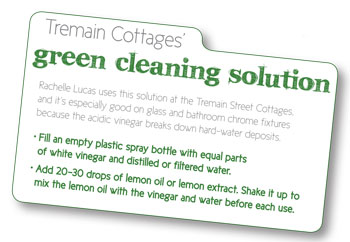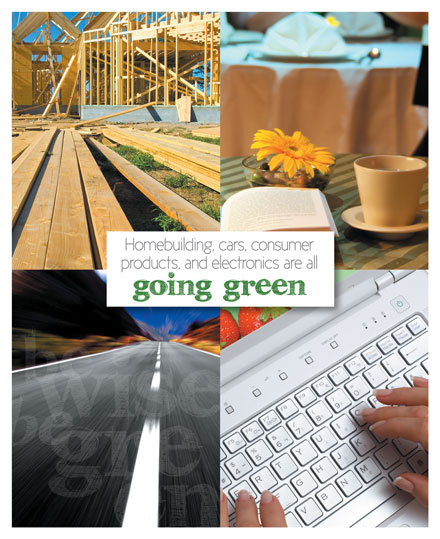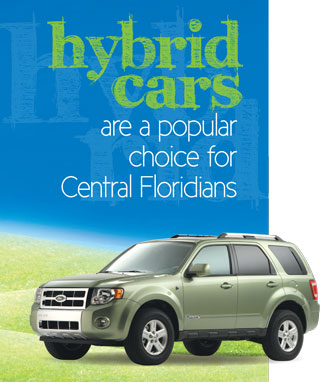Once upon a time clothes dried on a line outside, houses were cooled by opening windows, and recycling meant saving aluminum for the war effort.
Well, to quote the familiar song, “everything old is new again.”
The statistics tell the story why “going green” is more important than ever. America generates more waste every year, growing from 247 million tons of non-hazardous waste in 1990 to 409 million tons in 2001, according to BioCycle magazine. The Environmental Protection Agency reports that the average American produces 4.4 pounds of garbage per day, which amounts to about 1,600 pounds a year. And the Alliance to Save Energy says that even idle appliances, such as TVs, cable boxes, CD players, cordless phones, and microwaves, have “energy leaks” that account for 5 percent of total domestic energy consumption, cost more than $3 billion annually, and spew 18 million tons of carbon into the atmosphere.
An increasing number of Lake and Sumter businesses realize that being environmentally conscious or “green” is just good business. Using less energy, protecting and preserving natural water resources, and recycling are more than just a fad for these businesses who believe their small efforts will make a difference.
 Lodging in a Green Way
Lodging in a Green Way
Tremain Street Cottages in Mount Dora, owned by Rachelle Lucas and Brian Young, was the first lodging establishment in Lake County to commit to the Florida Green Lodging Program sponsored by the Florida Department of Environment Protection (DEP).
Rachelle says meeting the criteria for the program was probably easier because she has always been environmentally conscious.
“We’ve always used nontoxic cleaning supplies. I make my own, using distilled water, white vinegar, and lemon oil,” Rachelle says. “I use this cleaner for all windows and glass. It’s streak-free and doesn’t harm mirrors (or your lungs) the way ammonia-based products do.”
To become certified “green,” the facility has to meet specific criteria in water conservation, energy efficiency, waste reduction, and clean air. Rachelle and Brian took steps related to each of these areas to ensure their establishment has less of an impact on the environment. Some of their changes included using more energy-efficient compact fluorescent light bulbs and installing timers on outdoor lighting. They also installed low-flow showerheads and faucet aerators to conserve water.
“One common misconception is that low-flow equals low-pressure,” Rachelle says. “Actually, it’s quite the opposite. The showerhead is designed to restrict water flow and actually creates more pressure.”
As part of the recycling programs, Rachelle buys bulk products and then refills smaller containers of shampoos and other items for use in the cottages.
“We also buy recycled paper products and recycled copy paper,” Rachelle says.
After designating all rooms non-smoking, Rachelle and Brian also installed high efficiency air filters that pull out allergens and dander. A recycle bin is placed in each cottage to encourage guests to recycle items like aluminum and plastic containers. The cottages are cleaned with environmentally-safe cleansers that are nontoxic and biodegradable.
In addition to what was required to become certified for the Florida Green Lodging Program, Tremain Street Cottages also added some extra little touches.
“Guests find organic lavender sachets on the pillows, organic free-trade coffee, and environmentally friendly soaps and shampoos,” Rachelle explains.
Tremain Street Cottages also supports another big ‘green idea’ movement and that is buying locally to support local farmers and businesses.
“We purchase as much as we can from downtown merchants, including our soaps, shampoos, coffee, and quilts,” Rachelle says.

Building Greener Homes in Lake
Homebuilders in Central Florida are also working with state environmental groups to build “greener” homes in the area.
Lakes of Mount Dora, a community designed by Pringle Development, was recognized in 2007 for its green practices with a Florida Friendly Community Award by the University of Florida/IFAS Florida Yards & Neighborhoods (FYN) program.
Based on community design and preservation measures, these awards include criteria like using Florida Friendly landscaping practices, water quality and conservations measures, maintenance, education and overall quality/effort, and innovation.
Lakes of Mount Dora requires its builders and landscapers to follow FYN guidelines. The community uses reclaimed water for irrigation and puts in Zoysia rather than the traditional St. Augustine grass. Plants are on the approved Florida Friendly Landscaping list, and the development makes good use of its preserved areas.
“We have worked diligently toward increasing the efficiency of our homes and increasing the savings for homeowners while at the same time reducing the impact on the environment,” says Alan Parrow, CEO and president of Pringle Development. “We’ve worked, literally from the ground up, to build homes which use less energy and resources, and contribute to water and air quality. It’s a win/win situation.”
 Driving “Green” Cars
Driving “Green” Cars
Many residents are moving their green efforts to Florida’s roadways. Don Garret, general sales manager at Key Scales Ford in Leesburg, says hybrid cars are a popular choice for Central Florida residents.
“We got three in, and I’d say we sold all three of them within a month,” he says. “They’re very hard to get in this part of the country. Ford ships a lot to California and New York, because the cars are good for city driving.”
Hybrid cars go into electric mode when the speed is less than 25 miles an hour or less. The cars are efficient in high-congestion areas where stop-and-go traffic is the norm.
Key Scales Ford plans to continue ordering hybrid cars. If a hybrid is not in your immediate future, however, consider the following measures to improve your vehicle’s fuel economy: schedule regular tune-ups; use the manufacturer’s recommended grade of motor oil; clean or replace air filters, and keep tires properly inflated. And according to the Alliance to Save Energy, simply obeying speed limits can result in increased fuel savings, from 7 to 23 percent annually.
Brewing for Recycling
Steve Franklin and his parents, Jim and Bessie, own the Chocolate Lab Coffee Company just off Highway 441/27 in Leesburg. The Franklins believe recycling is important wherever you are. They use the curbside recycling at their home, but haven’t been able to get service at their business.
“I can’t get the city to recycle anything for my business,” Jim says with frustration. “I’ve talked to the city manager and the people at public works, and they said they’re hoping to get a program going sometime in 2010.”
The family, however, has found a way to do their part: The coffee shop serves the hot brew in cups that feel like Styrofoam but are actually paper.
“Personally, I believe in it [recycling] strongly,” Steve says. “I’d like to see the newspaper go online completely so I wouldn’t have to deal with all that paper.”
Adding Up the Small Efforts
Another area of recycling that few people think about is used electronic equipment. Joe Painter of Managed Asset Recovery (MARS) says that computers are 100 percent recyclable.
“We’re trying hard to keep this stuff out of land fills,” Joe says. “First, we try to reuse it. If we can’t do that, we break it down to plastics, metals, populated boards, and so on. If it plugs in, we can recycle it.”
The Tavares company works primarily with government agencies, hospitals, banks, and large institutions that change their computer systems frequently. They are very willing to work on an individual level, too.
“People come by here and drop off personal computers or telephones,” Joe says, “and we’re more than willing to take them.”
Chris Kao, who owns Perfect 10 salon in Fruitland Park, says she loves recycling and has always done it, both at home and in her hair salon business. She takes the big bottles of shampoo home when they can no longer be used at the salon and puts the leftover shampoo into smaller bottles for family use at home.
“We get detergent in five-gallon buckets, so I save them, paint them green because I take them outside, and we use them as stools,” Chris says. “We have 10 acres, so we do a lot of stuff outdoors, and they’re perfect for that.”
People and businesses in Central Florida are becoming more aware of the need to “go green” and their impact on the environment. The small things are adding up to a much larger community-wide picture.
5 ways to make a difference and save $
- Look for the Star:
When it’s time to replace your appliances, look for the ENERGY STAR label, which is the government’s rating program. When not using chargers for electronic items, unplug them. They continue to draw energy when left plugged into the outlet. Appliances can account for 20 percent of your total energy bill.
- Windows Upgrade:
Replace single window panes with low-e coated windows. Efficient windows can lower your heating and cooling bills up to 30 percent. Storm windows can reduce your winter heat loss by 25–50 percent.
- A Bright Idea:
Change your outdated incandescent light bulbs: 95 percent of the energy used goes to heating the bulb, adding unwanted heat to your home in the summer. Replace your five most-used light bulbs with compact fluorescent bulbs and save $60 each year in energy costs.
- Water Conservation:
Adjust the water level on the washing machine so there’s no excess water used. For best results, always wash a full load of clothing. If your washing machine is a top-loading energy-inefficient model, switch to cold water washing to save up to $63 a year. Detergents formulated for cold water get clothes just as clean.
- Think Charity:
Motivate yourself to recycle by selling or donating what you don’t use to a worthy cause. Check the Yellow Pages for businesses in Lake and Sumter counties that buy recyclable materials. In addition to the many well-known charities that accept donations, some lesser known ones include The National Cristina Foundation, which matches donated computers and technologies to charities, schools, and public agencies in all 50 states, and the Let Me Play/Re-use a Shoe program that takes old athletic shoes and grinds them into materials for sports surfaces, such as synthetic soccer fields and cushioned basketball courts. For more information about these organizations, please visit www.cristina.org or www.letmeplay.com/reuseashoe/program.






